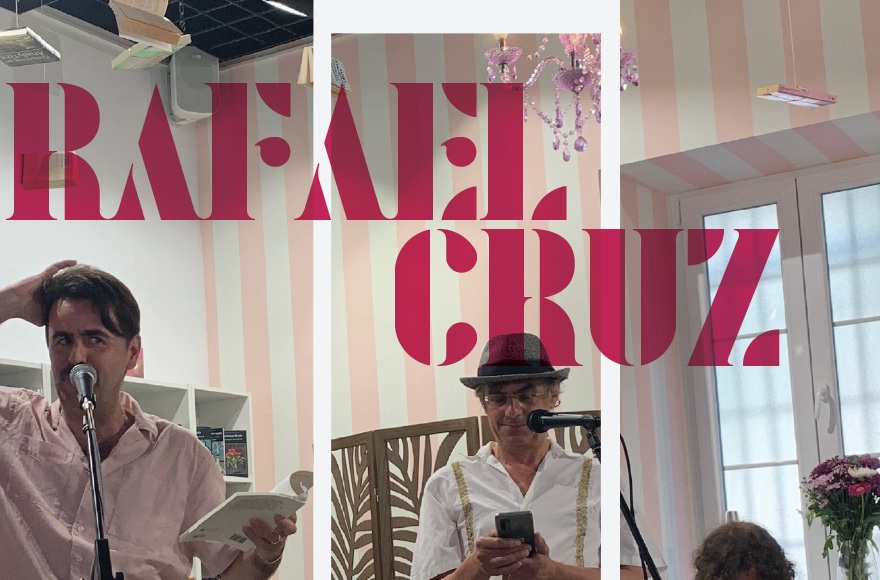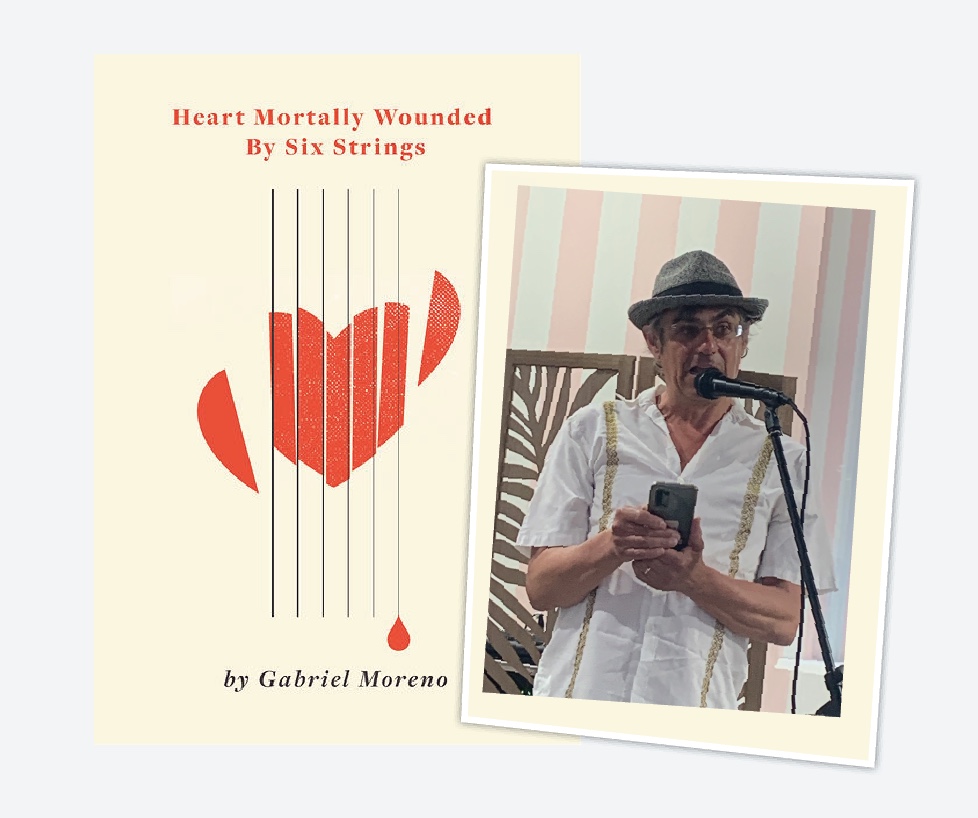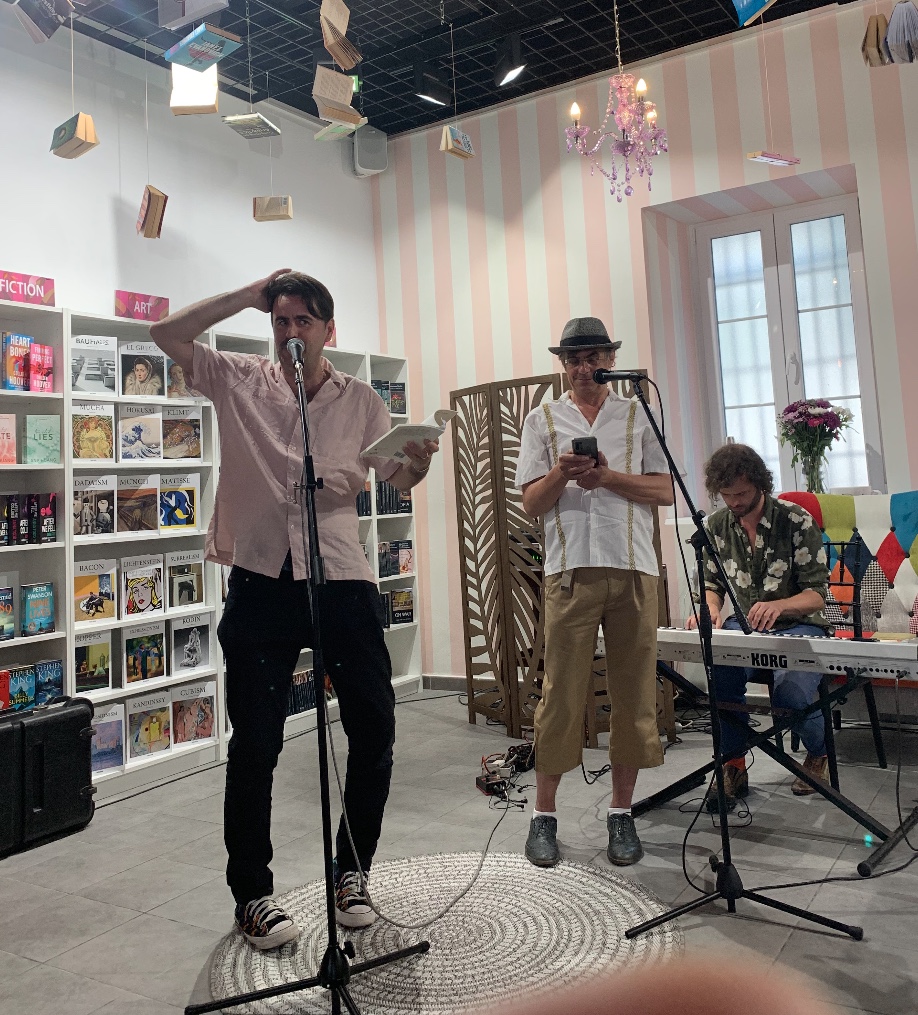Nothing lost in poetry translation
Rafael Cruz came to Gibraltar for the first time in early July on the occasion of the book launch by local poet Gabriel Moreno, who has just
completed his new collection of poems called ‘Heart mortally wounded by six strings.’
I met him at the launch and was able to see and enjoy his poetic translations. Rafael has also launched his new book ‘Keats Now’ which has already been launched in England and Spain. He did his thesis on TS Elliot and has translated his poems. On the day following Gabriel’s event at the new bookshop by Inces Hall, Rafael launched the Keats translations book called ‘Keats Now ‘at the concert which Gabriel was hosting in the ‘Kas Bar’, where texts in English followed by his new translations were given a premiere and one was able to appreciate various Keats poems in our two familiar languages and also witness the charismatic translator reading them.
Side by side and in the moment it was a first here, the poems were very well received, leading to a conclusion on my part that this was a good thing that we need more of and so I sat down with Rafael Cruz to learn more about him and his highly skilled work which he seems to enjoy greatly, sharing and comparing ‘live’ in front of an audience. He has his own publishing house in UK called Goat Star Books and our ensuing chat was the backbone of this text which will fall short in depicting this effervescent and larger than life culture vulture who has fallen in love with our city and its convivial inhabitants. I asked him how and when he first came to translate poetry from English to Spanish and to Catalan also, as Rafael is a proud Catalan who has lived in UK for thirty one years.
“It started during the pandemic when so many people changed. I used to teach Spanish literature and poetry at the London School of Economics among other places and how poetry relates to political and socio-economic issues and I had to teach Spanish because it was Hispanic studies. I thought it was impossible at first but then during the Pandemic people were doing odd things and I started translating TS Eliot’s Four Quartets. It is the poet that I love most in all literature and it was magic and it was flowing, so I shared it with a poet friend of mine in Mallorca and also on Facebook platforms where I am very active. I did rate my translations but being validated by such a good poet whom I admired, I thought I was on to something and then I started translating his own poems from Mallorcan Catalan into English. He was delighted. He speaks fluent English because as a scientist he studied at the Imperial College in London. He said to me that it seemed as if he had written his poems in English and I took that as a great compliment because it validated my work. That is how it all began and if you had asked me before the Pandemic, I thought that it was impossible for me to translate poetry.”
How does he deal with rhyme and meter, how does he capture the soul of a poem elicited a surprisingly simple answer. “I deal with it very easily – I do away with it because Spanish and English are very different languages. One is syllable based and the other is stress pattern based. I take the original and think how would I say this in Spanish and this is where the chemistry and the magic happens. I see myself as a medium contacting the spirit of the poem. The rhyme is beautiful in English but I am free to describe how I am touched by it. All I have to do is say in Spanish in a beautiful way what the poem says. That is how I can best explain what I do. I have read a lot of poetry and I’ve developed a kind of instinct to know when it flows naturally. If you were to give me a Shakespear sonnet I would be able to translate it in a way that you would think it had been written in Spanish. It is not disrespecting the poet or rhyme or the words or the pattern. What Shakespeare says in the sonnet will mean the same in Spanish. I am a TS Eliot fan and one of the good things that he did was to do away with rhyme. He created modern poetry and used modern speech. That’s what I do and that’s what most poets do nowadays. We try to bring poetry in tune with the way we speak.”
So what is your best hope when translating classic poetry into Spanish and potentially introducing a new market for it? “I’m very daring and never feel intimidated, I just go for it and try to capture the emotion in the original. That’s my best hope – that you the reader feel the emotion. I wouldn’t have carried on with my project if I had not succeeded in that. My reception here yesterday was such that many came up and said ‘Wow Rafael that was so refreshing to hear in Spanish’. I feel validated by that and if it were not so I would stop.“
Goat Star Books is the publishing house behind Rafael Cruz and it’s his company that he works for, deep in the heart of Cambridgeshire. His house is called Capella and it’s a star constellation depicted by a Goat and its kid which is called Capella. “I first translated the poems of Angel Terron from Mallorca into English and he suggested to me that I should try to present an anthology to one of the major publishers in UK, but during the pandemic everything was held back till this year, so imbued by the spirit of my generation (70s) rebellious and determined, I had to do it myself. You cannot wait for somebody for three years. You have to displace the old order and move on. I understood where they were at the time so I have since then already published three books. In Angel Terron, the Mallorcan poet, I published an excellent Spanish poet in English and I had very good reception and sold out the first edition. We have been growing ever since and we have to grow more. I need more infrastructure and that takes time. So far it has been a labour of love.”
Rafael only takes on two translation projects a year and he has a new project that could involve a very famous poet in England. He doesn’t have the rights yet but if it materialises it’s the huge responsibility that excites him, but that is in the back burner at present as there are lawyers involved because he is a famous poet and still alive! He mostly deals with dead poets so there are no lawyers involved with John Keats’ work. His next book is projected for release in November and it will be a translation of a young Pakistani poet called Danial Danish who comes from Faisalabad, a post-colonial city in Punjab where English is a major language, the lingua Franca there, so his poetry is in English and it’s very strong. He talks about inequalities, poverty and his country mainly. He is 27 and still very young for a poet, but he has something special. Rafael is going to publish him in English and in Spanish as there is a huge Pakistani community in Barcelona. In the centre of the region, the schools are seventy per cent Pakistani children. That is where Rafael Cruz comes from so he has researched the potential market there. The children are born Catalans and there is the potential also for Catalan translations. He feels that he is ‘going into the eye of the storm’ as Catalans still refer to the Pakistani communities as ‘newly arrived’ although there is a whole generation already born there who are native to Catalonia. With Gabriel having studied in Barcelona I wondered at this point how he got together with Gabriel for this Gibraltar project.
“I hooked up with Gabriel Moreno through a common friend from Barcelona, as Gabriel had lived and studied there, and this poet friend said that I should meet him. I had never thought of Gibraltar at all so I met Gabriel in London and he had the book that we presented yesterday (‘Heart mortally wounded by six stings’) and was at the time looking for a publisher. I told him that my remit was only translations and that I only publish my translated works. His project was too far advanced to go back and wait for a translation so we decided to work together and explore a future collaboration. I asked him to a write book about a ‘Gibraltarian in the world’ which could then be translated into Spanish and launched here and in Barcelona, in London and in Madrid. Spain doesn’t take into account that in over 300 years, Gibraltar has evolved into a community that is not Spanish. How could they be the same when they haven’t had a civil war, and a fascist dictatorship? They have an English culture which has evolved into a multi-cultural community where religions are represented and respected. The Church still has a strong grip in Spain and we are so different. The language unites us but we have grown apart with over 300 years of history dividing us. That fascinates me and now I’m hooked with Gibraltar and its people.”
As I ponder on how to wrap up this enthralling chat with Rafael Cruz which I have just transcribed, I am dipping into a book he gifted me of Surrealist poems that he has just translated from Spanish into English. Its catchy title is ‘Popping Corn’ and the poet Mendigo Diego (alias Manolo Marcos born in Rotterdam 1968) now residing in Cordoba, where he paints, writes poetry and is also an active musician, a sax player who can be seen playing around the Roman Bridge. In this anthology of some eighty short (three stanza) poems, Rafael puts on the poet’s hat and has given the poems a new life in the faithful translations that almost jump out of the pages because you are quickly drawn to the English texts to see whether they work well and they do, so you get hooked and tend to discard the Spanish language text adjoining, without disrespecting it, almost forcing yourself to look at it only after you’ve read the English. It says something about ‘duende’ a certain ‘grace’ which describes flair and as the readings repay your curiosity you‘re thinking ‘Why didn’t I think of that?’ Too late – you don’t have to. It’s already done and Rafael Cruz has got the t-shirt and the hat which he wears well. This man will be back to visit us and a future project with Gabriel Moreno will twin them up again for our enlightenment and entertainment.










